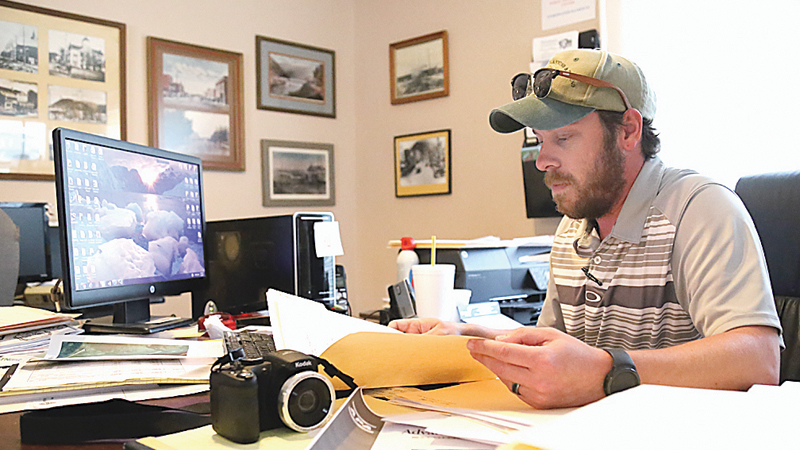County Planning Dept. addressing problem properties
Published 4:49 pm Friday, June 1, 2018

- Star Photo/Abby Morris-Frye Carter County Planning Department Code Enforcement Officer Jay Cook reviews a case file regarding property violations.
A change to state law that went into effect earlier this month along with a resolution adopted by the County Commission late last year has given county officials more tools to help address complaints about derelict properties.
With the changes to state law and county code, Carter County Planning Director Chris Schuettler said he and his staff have an improved process to follow when working with property owners to get violations corrected.
Under the previous policies, the Planning Department was required to send all notifications to property owners by certified mail. However, when a property owner would refuse to pick up or sign for the letter, it created an obstacle for the county in being able to prove that the owner had been properly notified of the violations and given time to correct them. The change to the process now provides the Planning Department a way to move forward past that obstacle.
“If they refuse to accept their certified letter or sign the affidavit saying they have been notified we can publish it in the newspaper for two consecutive weeks as their notification,” Schuettler said.
The ultimate goal of the process is to get property issues corrected and cleaned up without having to take the matter to court, according to Schuettler.
“If it is a definite nuisance, we will speak with them and try to get them compliant with the resolution,” Schuettler said. “We attempt to work with people. We’re not here to strong hand anyone.”
Many of those the Planning Department contacts regarding violations on their property work to correct the problems, according to Schuettler. For those who refuse to fix the issues, Schuettler said the county could pursue the matter in court to bring the property into compliance.
The majority of the property violations the Planning Department investigates begin as complaints called in by residents.
Most of the complaints deal with trash piled up, overgrown vegetation, or junk on the property, according to Carter County Building Inspector Mel McKay. The office also receives complaints on untagged or junked vehicles on properties.
Those type of issues create not only problems for the property owner or person who lives there, but they can also create hazards for adjacent properties and neighbors. In addition to having an impact on property value, Schuettler said overgrown vegetation and litter on the property can also attract mosquitos, vermin, and other pests.
Under the resolution adopted in October by the Carter County Commission, “no property owner shall create, maintain, or allow to be maintained conditions on property that are dangerous or injurious to occupants of the property, occupants of neighboring property, or other residents of the county, assuming ordinary health and sensibilities.”
The resolution cites the following conditions as prohibitable but notes that violations are not limited to merely these items:
• the accumulation of litter, garbage, refuse, rubbish, or other defects that increase the hazards of fire, accidents, and/or calamities
• the accumulation of litter, garbage, refuse, rubbish, and/or other general unsanitary conditions that endanger the health, safety or welfare of people living on the property and/or other citizens, or create the conditions for the infestation of rats and other harmful animals
• the obvious neglect and overgrowth of vines, grass, and/or underbrush that endanger the health, safety or welfare of people living on the property and other citizens, and/or create the conditions for the infestation of rats and other harmful animals
• the presence of vacant and/or dilapidated buildings or structures that could endanger the health, safety or welfare of people living on the property or other citizens, and/or create the conditions for the infestation of rats and other harmful animals.
The change to state law which was passed by the Tennessee General Assembly this year and became law on May 4 closed clarified language which created an ambiguity for county officials seeking to address problem properties.
As enacted, the change to law “allows removal of overgrown vegetation and accumulated debris on owner-occupied residential property.”
McKay said the previous wording of the law created an ambiguity of whether or not the county could pursue action on a property that was occupied by the owner. The recently approved change cleared the issue up, McKay said.
With the changes to state law and county code in place, Schuettler said his office is currently working on several complaint investigations under the new wording and process. He said there are approximately 30 investigations where the property owners are working to correct the violations. Another five cases involving a total of nine properties are currently in the notification process that will result in the cases being forwarded to the county attorney for prosecution.





